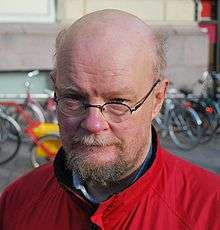Basic income in the Nordic countries
Basic income (Swedish: basinkomst or medborgarlön) has been debated in the Nordic countries since the 1970s. It has mostly been seen as a radical and utopian proposal and not taken seriously by the big political parties. However, in recent years there has been some notable victories for the basic income movements in the region. In Sweden the Green Party (Miljöpartiet) is aiming for a state investigation on basic income. In Finland the Centre Party, which won the national election 2015 and leads the government, is pushing for a basic income pilot project. And in Iceland the Pirate Party, which has been leading the monthly polls 2015, has basic income (or investigation about it) as one of their top priorities. Some of the leading advocates in the Nordic countries are: Valter Mutt, Annika Lillemets, Lars Ekstrand, Osmo Soininvaara and Erik Christensen.
National debates
Sweden
Basic income was debated in Sweden in the 1970s and 1980s, mostly thanks to influences from abroad, such as Milton Friedman and André Gorz. The Swedish/Danish economist Gunnar Adler-Karlsson was also influential at that time. During the 1990s the ideas came back again, for example with the polemic books by Lars Ekstrand 1995 and 1996. He criticized the full employment-ideology and argued, with reference to people such as Paul Lafargue and Aristotle, but also the Danish debate, that freedom would be a much better goal. Gunnar Wetterberg, leader in the labour Union, was perhaps the most active in the other ring-side, arguing that basic income was a threat to just about everything, but mostly jobs, growth and equality. The Green Party has flirted with the basic income idea since the start of the party, but has nevertheless not pushed for it seriously politically. However, the party congress 2015 decided that the party should work for a state investigation. None of the other political parties in the parliament is for basic income, or even basic income pilots, at the moment. But the Feminist Party (Feministiskt initiativ) and the Swedish Pirate Party (Piratpartiet) are both positive. Especially the Pirates, who sees automation and technological development overall, as a key argument for basic income.
Finland

Among the bigger political parties there are nowadays three main political forces for basic income in Finland, the Green Party, the Left Party and the Centre Party. The leading advocates in Finland includes Osmo Soininvaara, Green Party, and Li Andersson (Left Party).
Denmark
The basic income-concept became known in Denmark in the late 1970s with the book Oprør fra midten. The following decades the debate continued, with some small victories for the movement, but nothing like a big break through. In the national election 2015 a new party was elected into parliament, Alternativet, which is positive to some kind of basic income.
Iceland
The basic income debate in Iceland in recent years is strongly linked to the recent rise of their Pirate Party, with Birgitta Jonsdottir as one of the front figures.
History (year by year)
1970s and 1980s
- 1970: Samuli Paronen, Finland, proposed basic income in a book.
- 1978: The basic income concept becomes well known in Denmark thanks to Oprør fra midten.
- 1980: The basic income idea is introduced to Finland in the book “Finland in the 1980s”, by Osmo Soininvaara and Osmo Lampinen.
1990s
- 1990: Enhet, a small Swedish party, is founded.[1]
- 1995: Lars Ekstrands Den befriade tiden is published.
- 1996: Ekstrands Arbetets död och medborgarlön, is published.
2000s
- 2000: Erik Christensens Borgerlön – Fortaellinger om en politisk idé is published. Den nya sociala frågan, the Nordic basic income anthology where also Philippe Van Parijs contributes, also reach the public.
2010s
- 2012: A Finnish basic income campaign starts of Mars 28.[2]
- 2014: In the months before the Swedish national election there are several articles in the press. Valter Mutt, Carl Schlyter, Annika Lillemets and Karin Jansson, Green Party, argues for basic income pilots both in cities and in rural areas.[3] The leader of the Centre Party in Finland, Juha Sipilä, is pushing for the same in Finland.[4]
References
- ↑ Enhet - official homepage Archived July 15, 2015, at the Wayback Machine.
- ↑ Finland: launch of a basic income citizens’ initiative Basic income news (read January 30, 2013)
- ↑ Mutt, Valter med flera Dags för försök med basinkomst ETC 2014-09-13 (läst 1 april 2015)
- ↑ Perkiio, Johanna Finland: the opposition leader proposes basic income pilots Basic Income Earth Network, www.basicincome.org (läst 1 april 2015)